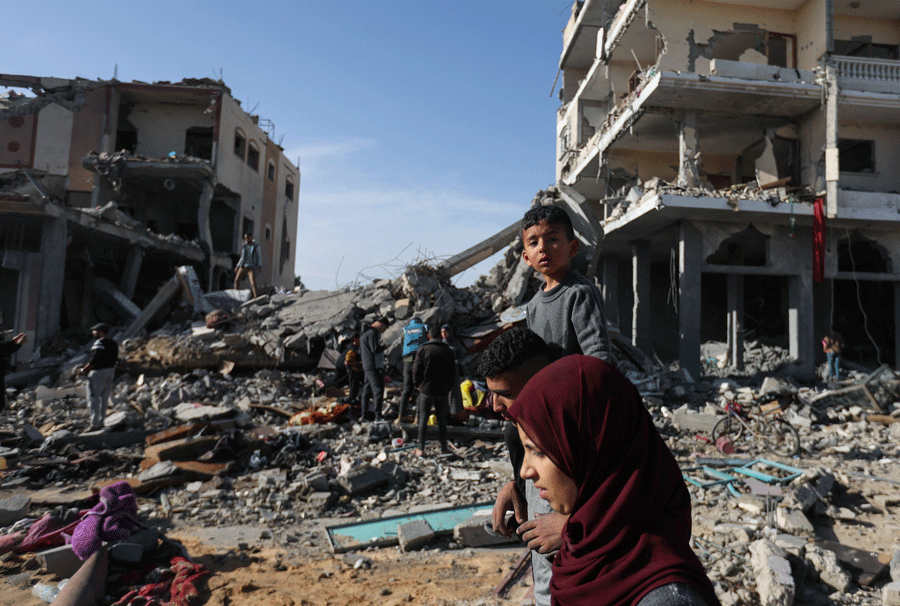
Published :
Updated :

It is not without reason that all eyes are now locked on the unfolding situation in the Middle East. What started as a conflict between Israel and Hamas has already spilled over to the region, albeit on a limited scale. Non-state actors like Hezbollah and the Houthis have had their forces committed to a tit-for-tat strategy against Israel. Today, that theatre has changed dramatically with more direct attacks between Iran and Israel. Whether or not there will be a full-blown war between the countries is any one's guess. However, what concerns countries, including Bangladesh, is what impact it will have on shipping routes and what will it mean for crucial energy supplies.
From the Bangladesh perspective, it would spell doom. Unfortunately, there is no other way to put it. As per international news reports, the International Monetary Fund (IMF) had already warned last month that should the Middle East conflict develop into open hostilities in that region, this would inevitably lead to higher oil prices. That would reverse the global fall in inflation and be a major blow to financial markets. In a fast-changing environment, there is no guarantee that war will not break out between Iran and Israel. This would turn the global economic order on its head because if the Red Sea were to become a battle ground, then there is every possibility of a prolonged global recession.
Countries like Bangladesh that are already battling a tough battle with falling foreign exchange reserve and where today, more than half its energy mix comes from fossil fuel imports from foreign markets including the Middle East, it would serve a blow so severe, there can be no meaningful projection on how far back it will set the country in terms of economic regression. This is the problem with the energy mix planning in this country.
It goes beyond Bangladesh's ability to get sufficient shipments of liquid fuels from that region. Interest rates would go through the roof as shipments would fall using the Red Sea route. Given the paucity of foreign exchange at Bangladesh's disposal, it would be literally impossible to import at the present rate and the end result is anyone's guess. Previous wars in the Middle East have led to sharp increases in oil prices that in turn were responsible for price explosion of commodities.
As pointed out by the IMF's economic counsellor Pierre-Olivier Garrinchas recently, "The increased inflation that would come from higher energy prices would trigger a response from central banks that would tighten interest rates in order to secure inflation coming back to target, and that would weigh down on activity. It would do so in a context in which, in some countries, activity and growth is already fairly weak, so that might also have a strong effect there." Evidently, Bangladesh falls into that category of countries which are presently "fairly weak". As pointed by the IMF official, a 15 per cent rise in oil prices and the higher shipping costs that would most certainly follow could lead to a 0.7 per cent increase in global inflation and would result in damaging both business confidence and investment.
Can Bangladesh afford a 15 per cent increase in global energy prices? It already has to deal with the dual shock of paying for energy supplies and foreign debt repayment. There are numerous reports of the country resorting to desperate measures whereby it is taking short-term hard loans to defray the costs associated with importing both energy supplies and electricity from abroad. While a lot of optimism has been placed on off-shore energy exploration, any discovery there and probable addition of such energy to the national grid will be years in the making. What is happening in the Middle East is beyond Bangladesh's control. Still, there is no movement on putting energy exploration of probable gas finds on-shore on a war-footing. There is practically zero-movement on the coal issue, where at least the government knows for a fact how much coal exists and where. Similarly, it has in its possession internationally conducted reports / surveys of probable large-scale gas fields that can be explored in the Chittagong Hill Tracts, but for reasons known only to itself, there is also no movement there either.
Supposing war does break out between Israel and Iran in the near future and one that will inevitably draw in proxy forces belonging to both sides in the region and beyond, what excuse will policymakers give then? Sadly, the game will be over by then and it won't matter. One can only hope that international tensions will not tip over the boiling point, but it is disheartening to see that there is literally no contingency plan on our part if push comes to shove.
mansur.thefinancialexpress@gmail.com


 For all latest news, follow The Financial Express Google News channel.
For all latest news, follow The Financial Express Google News channel.